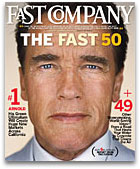Walmart
-
Clean-up on aisle … earth
Maybe not on price, but on solar.
Wal-Mart just announced about 10 MW of solar on 22 stores.Nice.
Kohl's, a
grocery chaindepartment store, is doing 30 MW.Nicer.
These are significant contracts, and the companies signing them deserve kudos for putting their money where their mouths are.
-
Following U.S. consumerism through the fields of China and Brazil
In what surely counts as one of the greatest feats in the history of global trade, the United States has essentially outsourced its manufacturing base to China in little more than a decade. It all starts with shuttered factories. Photo: iStockphoto But in doing so, the U.S. has helped unleash new trends in global agriculture […]
-
And another way forward.
On April Fool’s Day, Grist ran a fake bit on how Wal-Mart had “pulled the plug” on much-ballyhooed green initiatives, including its plan to to become the nation’s number-one organic grocer. “In the end, our customers value low prices more than sustainability, and at Wal-Mart, we listen to our customers,” Wal-Mart’s CEO (fictionally) said. As […]
-
New Yorker article reminds you why you hate it
Stacy Mitchell did a bang-up job earlier this week of explaining why Wal-Mart and other big-box stores could never actually be green. But if you need a more wide-ranging reminder of Wal-Mart’s deep and abiding loathsomeness, check out Jeffrey Goldberg’s article in the latest New Yorker: “Selling Wal-Mart: Can the company co-opt liberals?” If you’ve […]
-
The impossibility of a green Wal-Mart
With its recent flurry of green initiatives, Wal-Mart has won the embrace of several prominent environmental groups. “If they do even half what they say they want to do, it will make a huge difference for the planet,” said Ashok Gupta of the Natural Resources Defense Council. Environmental Defense, meanwhile, has deemed Wal-Mart’s actions momentous […]
-
All these green initiatives, oy
Wal-Mart CEO Lee Scott just announced a comprehensive new initiative called “Sustainability 360,” which will attempt to infuse environmental concern in every part of the company’s operations: “Sustainability 360 takes in our entire company – our customer base, our supplier base, our associates, the products on our shelves, the communities we serve,” said Scott. “And […]
-
But why?
Peter Madden, chief executive of Forum for the Future, writes a monthly column for Gristmill on sustainability in the U.K. and Europe.
British supermarkets are now competing to go green. Two big retailers have just launched initiatives to tackle climate change.

Marks & Spencer, which sells food and clothing to Britain's middle classes, promised this month to cut waste, sell fair-trade products, and make the company carbon neutral within five years. Environmentalists praised its 100-point "eco-plan." Greenpeace U.K. said, "If every retailer in Britain followed Marks & Spencer's lead, it would be a major step forward in meeting the challenge of creating a sustainable society."
Later the same week, Tesco, one of the top five retailers in the world, set out its own stall on climate change. As the giant of British supermarkets -- one in every eight dollars spent in British shops goes into its tills -- Tesco is in a similar position to Wal-Mart in the U.S., and faces many of the same criticisms.
-
Wal-Mart pushes CFLs
Wal-Mart has has started a new campaign to push compact fluorescent light bulbs in their massive retail stores, according to an article published in the New York Times yesterday. Though only a reported 6 percent of homes use CFLs currently, Wal-Mart hopes to sell 100 million of the bulbs each year by 2008. “The environment […]
-
Wal-Mart may sell organic, but it also thrives on ruined downtowns and long freight hauls.
I've always been a bit appalled by the polite applause with which some enviros greet Wal-Mart's "green" initiatives. Seems to me that the only way the company could really "go green" would be to stop selling cheap plastic crap shipped in from halfway around the world in vast suburban megastores. In other words, completely change it's business model -- not, say, adopt "green" building techniques for its appalling superstores, or haul mass-produced "organic" food from California, Mexico, and China to stores nationwide, thus burning lots of fossil fuel and potentially squeezing profits for farmers and sparking consolidation and industrialization in a movement that arose to challenge same.
Deep breath.
Sometime Grist contributor Bill McKibben nails it in the latest Mother Jones.
Money quote:
